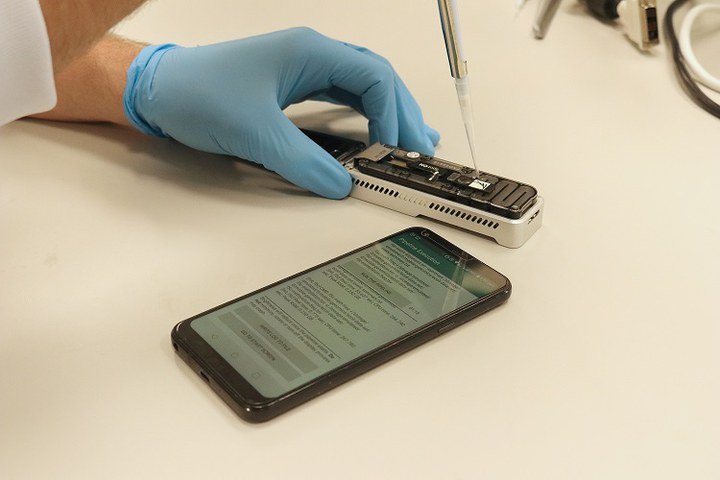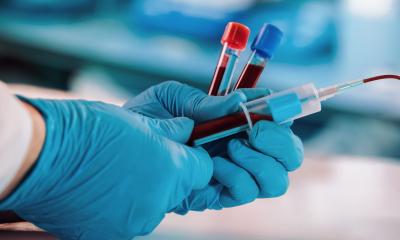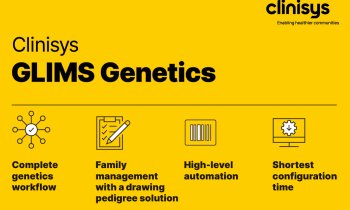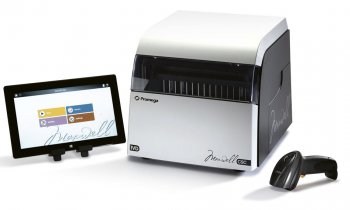
Source: Garvan Institute of Medical Research
News • Genetic
App analyses Covid-19 genome on a smartphone
A new mobile app has made it possible to analyse the genome of the SARS-CoV-2 virus on a smartphone in less than half an hour. Cutting-edge nanopore devices have enabled scientists to read or ‘sequence’ the genetic material in a biological sample outside a laboratory, however analysing the raw data has still required access to high-end computing power – until now.
The app Genopo, developed by the Garvan Institute of Medical Research, in collaboration with the University of Peradeniya in Sri Lanka, makes genomics more accessible to remote or under-resourced regions, as well as the hospital bedside.The researchers report the app Genopo in the journal Communications Biology.
Not everyone has access to the high-power computing resources that are required for DNA and RNA analysis, but most people have access to a smartphone
Ira Deveson
“Not everyone has access to the high-power computing resources that are required for DNA and RNA analysis, but most people have access to a smartphone,” says co-senior author Dr Ira Deveson, who heads the Genomic Technologies Group at Garvan’s Kinghorn Centre for Clinical Genomics. “Fast, real-time genomic analysis is more crucial today than ever, as a central method for tracking the spread of coronavirus. Our app makes genomic analysis more accessible, literally placing the technology into the pockets of scientists around the world.”
Genomic sequencing no longer requires a sophisticated lab setup. At the size of a USB stick, portable devices such as the Oxford Nanopore Technologies MinION sequencer can rapidly generate genomic sequences from a sample in the field or the clinic. The technology has been used for Ebola surveillance in West Africa, to profile microbial communities in the Arctic and determine coronavirus evolution during the current pandemic. However, analysing genome sequencing data requires powerful computation. Scientists need to piece the many strings of genetic letters from the raw data into a single sequence and pinpoint the instances of genetic variation that shed light on how a virus evolves.
“Until now, genomic analysis has required the processing power of high-end server computers or cloud services. We set out to change that,” explains co-senior author Hasindu Gamaarachchi, Genomics Computing Systems Engineer at the Garvan Institute. “To enable in situ genomic sequencing and analysis, in real time and without major laboratory infrastructure, we developed an app that could execute bioinformatics workflows on nanopore sequencing datasets that are downloaded to a smartphone. The reengineering process, spearheaded by first author Hiruna Samarakoon, required overcoming a number of technical challenges due to various resource constraints in smartphones. The app Genopo combines a number of available bioinformatics tools into a single Android application, ‘miniaturised’ to work on the processing power of a consumer Android device.”
Recommended article

News • Prototype
Portable point-of-care for Covid-19 tests
As COVID-19 continues to spread, bottlenecks in supplies and laboratory personnel have led to long waiting times for results in some areas. In a new study, University of Illinois, Urbana-Champaign researchers have demonstrated a prototype of a rapid COVID-19 molecular test and a simple-to-use, portable instrument for reading the results with a smartphone in 30 minutes, which could enable…
The researchers tested Genopo on the raw sequencing data of virus samples isolated from nine Sydney patients infected with SARS-CoV-2, which involved extracting and amplifying the virus RNA from a swab sample, sequencing the amplified DNA with a MinION device and analysing the data on a smartphone. The researchers tested their app on different Android devices, including models from Nokia, Huawei, LG and Sony.
The Genopo app took an average 27 minutes to determine the complete SARS-CoV-2 genome sequence from the raw data, which the researchers say opens the possibility to do genomic analysis at the point of care, in real time. The researchers also showed that Genopo can be used to profile DNA methylation – a modification which changes gene activity – in a sample of the human genome. “This illustrates a flexible, efficient architecture that is suitable to run many popular bioinformatics tools and accommodate small or large genomes,” says Dr Deveson. “We hope this will make genomics much more accessible to researchers to unlock the information in DNA or RNA to the benefit of human health, including in the current pandemic.”
Genopo is a free, open-source application available through the Google Play store.
Source: Garvan Institute of Medical Research
01.10.2020











